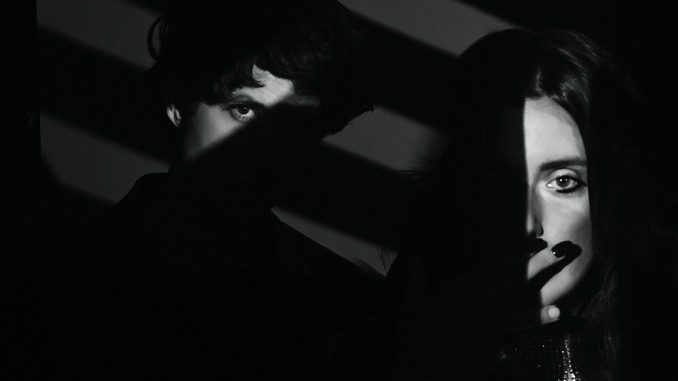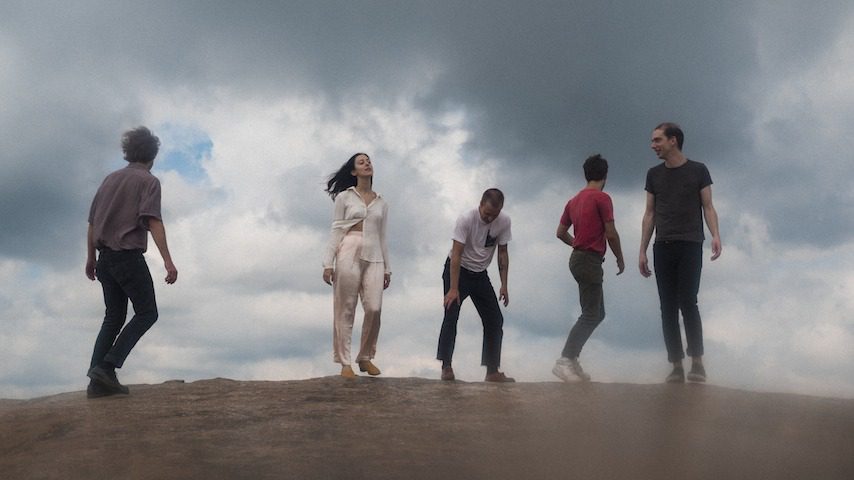Today (Feb. 18), Maryland dream-pop duo Beach House release Once Twice Melody, their eighth and most ambitious record in a critically acclaimed 16-year career. But way back in 2004, when Victoria Legrand and Alex Scally first linked up in the Baltimore indie scene, they were merely recent college graduates (Legrand from Vassar, Scally from Oberlin) making organ music in Scally’s basement. Fast-forward half a decade and the duo had cannonballed into resounding critical success, populating numerous decade-best and all-time-greatest album lists, and cementing themselves among acts like My Bloody Valentine, Cocteau Twins and Brian Wilson, art-pop bands and conceptual artists making urgent, texturized and ethereal soundscapes sound fresh and accessible.
Along with Beach House’s undeniable imprint on modern indie rock, shoegaze and dream-pop, the band’s work has appeared across numerous hip-hop and R&B songs, most notably sampled in The Weeknd’s “The Party & the After Party” and “Loft Music” (“Master of None” and “Gila,” respectively) and Kendrick Lamar’s “Money Trees” (“Silver Soul”). Their influence spans generations, too. Wayne Coyne, mastermind of The Flaming Lips, called Bloom one of the 10 albums that changed his life; “Space Song” and “PPP” have been backing tracks for viral, Gen-Z social media videos, showcasing the band’s multi-generational appeal.
As the duo celebrate another grand statement in a discography full of them, Paste is looking back on each project’s greatness. Below is a ranking of all eight Beach House albums, which range from really good to delicately sublime to ghostly masterpieces.
8. Devotion (2008)
Devotion is the first bridge album of Beach House’s career. It doesn’t have the barren lovesickness of its predecessor (Beach House), nor the timeless, ghostly pastorals of its successor (Teen Dream). Yet it’s a second record that carries no signs of a sophomore slump. Instead, Devotion is a bright mix of shoegaze and space rock, the true blueprint for Legrand and Skally’s tradition of disguising decay beneath shimmering, heavenly instrumentals. Some of the band’s tenderest lyricism remains here, like on “Gila” (“Hoping for the last ship to arrive / I am blessed with a kingdom, half mine”) and “Astronaut” (“I’ve made this brand / New bed / For you / I trust the things we do / Holy or not”), and the sound so distinctly praises The Beach Boys, but, sonically, arrives in the same artsy, off-kilter ballpark as Low or Sigur Rós. As Legrand said of the record: “[Devotion] felt like we were chasing something together. Two dreamers, together in a dreamworld.” Is it senseless to rank such a momentous step in a band’s discography at the bottom? For any other artist, absolutely; but for Beach House, it’s a testament to just how remarkable they’ve become.
7. Thank Your Lucky Stars (2015)
Released three months after Depression Cherry, Thank Your Lucky Stars is not a collection of B-sides, but a distinct work that serves as a much darker continuation of its predecessor’s motifs and themes. “Thank Your Lucky Stars” was etched into the runout grooves of Depression Cherry vinyls and both LPs were recorded concurrently. Artists rarely succeed at loading a single calendar year with multiple critically acclaimed projects, but Beach House managed to accomplish it easily. Thank Your Lucky Stars only suffers because Depression Cherry was still fresh in everyone’s minds upon its release. The truth is, it was the band’s first record with a perfect set of bookends (“Majorette” and “Somewhere Tonight”) since Teen Dream, and “Somewhere Tonight” remains the band’s warmest spectral offering to date.
6. Beach House (2006)
On their eponymous debut, Legrand and Scally cull influence from Mazzy Star, Nico and Cocteau Twins, but never collapse into ripping them off. The sound the duo conjure here is completely their own, a rich, lovesick swell of moody dream-pop that hasn’t yet found its apex, nor all of its footing. But even then, you’d be hard-pressed to find a debut with a more confident understanding of its own aesthetic: warm, oceanic, haunted. On future releases, Beach House would lean more properly into the bubbly, summer-esque motifs associated with their robust, dreamy sound; but in 2006, they focused heavily on the solemn desolation of forgotten paradises, of shivering landscapes at the peak of fall. On “Apple Orchard,” Legrand sings of warm companionship juxtaposed with emotional coldness (“Hold your inside / ‘Cause you’re cold at night / Warm your heart, love / ‘Cause you’re by my side); “Master of None” flirts with idealizing romantic partners (“I want your picture but not your words”). Scally gets caught up in an onslaught of slide guitar, while Legrand sings from the bottom of her throat with a spiritual ferocity not yet polished into her trademark, elegant coo. On every subsequent record, the band sound like they’re adrift someplace delicate; on Beach House, they perform like they’re still embracing what’s beautiful on solid ground.
5. Once Twice Melody (2022)
Once Twice Melody is Beach House’s magnum opus, despite not saying anything new at all. At an eruptive 18 songs, and clocking in at just under an hour and a half, the duo reach for new heights while fortifying their old tricks, joining a short list of artists like AC/DC and Bread who can, seemingly, copy themselves over and over, and never even flirt with a misstep. The duo released the record in chapters, doling out a record enormous in scale yet singular in quality. It’s a grandiose statement about productivity, and an even greater testament to Beach House’s infectious ability to place heavenly motifs against a backdrop of perfect pop hooks. The duo dabble in ambient (“Over and Over”), crash through flickering warmth on “The Bells” and even retreat into their trademark spectrality (“Masquerade”). “Pink Funeral” is one of their best songs in seven years, and the title track is their most sprawling opener since “Zebra.” On every preceding project, Beach House let their instrumentals and sparse lyricism shine; on Once Twice Melody, Legrand and Scally have a lot to say and refuse to mince words, and the result is just as magnetic.
4. Bloom (2012)
When Bloom came out, Beach House were still a new household indie name. They’d recently started selling out bigger venues while preserving a strong, critically successful résumé. But even at just four LPs, the band were injecting a prominent influence into the landscape of dream-pop while channeling their unique, existentialist sound into its own accessible genre. Sonically, Bloom doesn’t do anything Teen Dream didn’t, but while other bands were toying with the parameters of pop, Beach House were strengthening a wall of sound bursting with well-placed electronica and grappling with heavy, theological lyricism. “Myth” remains one of the band’s most precious tracks, where Legrand and Scally carefully ponder the other side of, well, everything (“What comes after this / Momentary bliss?” and “If you built yourself a myth / You’d know just what to give”); “Other People” is a gentle meditation on preserving relationships, brimming with Scally’s environmental synths and Legrand’s righteous falsetto (“Other people want to keep in touch / Something happens and it’s not enough”). The hooks on Bloom are much more restrained, patient; the depths of the record immensely golden and layered.
3. 7 (2018)
The most complex part about 7 is that it’s unequivocal in Beach House’s discography. The record is mixed like My Bloody Valentine’s Loveless and sounds like a synthwave film score, as if it’d be better suited for Drive or a John Carpenter flick than the commercial dream-pop canon. While Bloom felt more textured and Depression Cherry more ethereal, 7’s most evocative characteristic is how chameleonic it is, how the album so perfectly encapsulates every Beach House project preceding it. Somewhere, everything clicked, and the duo discovered how to be as dark as they were heavenly. Legrand channels Stevie Nicks and sings about communication breakdown in romance over the seering guitars on “Dive,” while Scally’s synthesizers on “Lemon Glow” are a haunted luxury that fill a saturated soundscape with heartsick hooks and unabated walls of atmosphere. “I had a good run playing horses in my mind / On a hillside, I remember I am loving losing life,” Legrand sings on “Drunk in LA,” as if she is a key part of a bigger entity discovering just how mortal they truly are.
2. Depression Cherry (2015)
Coming off the short concert film Forever Still, Beach House were facing another bridge album with Depression Cherry, a project connecting the band’s OG millennial fans with a new crop of Gen-Z listeners. When Vine was still around, a clip of Harambe welcoming someone to heaven, with “PPP” playing delicately in the background, went viral. There was a trend of levitation videos set to “Space Song.” Fans and admirers alike quickly became privy to the tonal breakthrough that took place on the band’s most confident project to date. It’s a loud ketamine trip; an audacious, starstruck lament. “Days of Candy” is the duo’s greatest closing epic, while “Levitation” features one of Legrand’s most triumphant vocal performances. On “Sparks,” she sings of a lonely disappearance juxtaposed with the joy of living. Depression Cherry isn’t as emotional as Teen Dream, nor Bloom, but it’s not meant to be. Yes, there’s still love and loss, and it’s a whole beating heart, but the magic of the album is in the floating, in the textured melodies and delicate world-building.
1. Teen Dream (2010)
“You know you’re gold, you don’t gotta worry none,” Legrand sings on “Zebra,” and immediately she emphasizes what rests at the heart of Teen Dream: a selfless, caretaking mantra. The soulful, magnetic grief of Beach House and Devotion were put, momentarily, to rest here, as the band’s Sub Pop debut is their first record that sounds like what we’ve come to consider the band’s trademark ethereal tone. It’s a sophisticated album that ditched the band’s early use of reverb in favor of sharper riffs and a precise, atmospheric energy. Like their own shoegaze and dream-pop predecessors (My Bloody Valentine, Cocteau Twins, Slowdive), Beach House had finally reached a summit where their generational sound was universal. Without Teen Dream, there’d be no Youth Lagoon, Alvvays or Wild Nothing. “Take Care” endures as Beach House’s rapturous insignia of maturity and, 12 years later, Teen Dream still sounds like bubblegum on a shooting star, like five extra minutes with a dying loved one, like a gentle, yet relentless waltz.
Matt Mitchell is a writer living in Columbus, Ohio. His writing can be found now, or soon, in Pitchfork, Bandcamp, Paste, LitHub and elsewhere. Find him on Twitter @matt_mitchell48.
Revisit Beach House’s 2010 Daytrotter session below.




